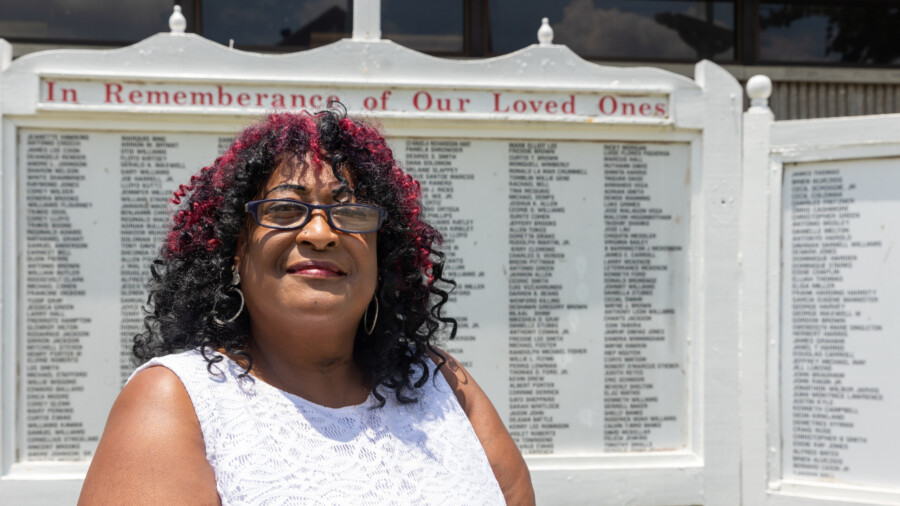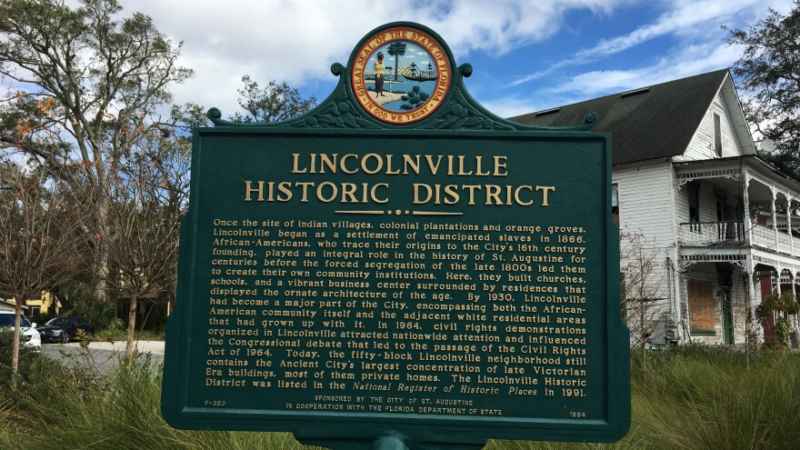This spring, Gov. Ron DeSantis signed Curtis’ Law, which mandates law enforcement agencies must provide contact information and case number information to the family of a homicide victim under 18. It also encourages sharing information about the status of an investigation to family members.
Curtis’ Law went into effect this past Saturday, July 1. And for Jacksonville resident Patricia Ward, Saturday was the day her son’s legacy changed the law in Florida.
The law is named after Curtis Williamson, whose 1997 death in Southern California was ruled a homicide. Ward, Curtis’ mother, has lived in Jacksonville for more than a decade.
“So many people will get the understanding to be more educated when their child passes away,” Ward told Jacksonville Today days before the law went into effect. “We, a lot of times, run to the police department for answers. But, Curtis’ Law educates you that the coroners have way more free information. And it’s a different case number.”
Ward has been fighting on behalf of her son more than a quarter-century after his death. She created a nonprofit that told his story. She pushed lawmakers in multiple states to consider legislation that would spur officials to provide information to the parents and guardians of children who have been killed.
“It will help families like us navigate through the justice system,” Ward says. “With Curtis’ Law legislation, community and police — we all come together.”
Though it can’t bring him back, Curtis’ Law, she believes, will ensure other families will not live through some of the agony she did.
In March 1997, Curtis and his cousin were chased into Mission Bay after a fight in a San Diego parking lot. He was found the next morning. He was 16 years old.
A report in the San Diego Union-Tribune at the time was headlined “Drowning of boy, 16, is being investigated.” It quoted a San Diego homicide detective and detailed how Curtis swam offshore to evade a group of people who wished him harm.
Police later contacted Ward and told her that her boy accidentally drowned because he could not swim. That didn’t make sense to her.
“He taught everybody how to swim. He made sure they knew the safety procedures,” she says.
Years later, his death was ruled a homicide, but in the 26 years since Curtis died, no arrests have been made.
“You know how they say, ‘They’ve been here before?’ That was Curtis,” Ward says. “And, he had so much love and heart for anybody. He loved his family…When he talked to you, he didn’t just give you a fish. He taught you how to fish.”
Curtis was set to graduate from San Diego’s Garfield High School that spring. Ward wore Curtis’ graduation cap in May when Gov. Ron DeSantis signed the bill.
Ward spent so much time driving along I-10 this spring for committee meetings that the Chevrolet Impala with a logo of Curtis on it now needs work.
“When criminals inflict the ultimate loss on a family — the loss of a beloved child — government must aggressively investigate and hold those criminals accountable, and that family should never be left in the dark. Those loved ones have a right to be informed about the status of those investigations,” DeSantis said in a statement following the bill signing.
For Jacksonville’s Russell Jackson, DeSantis’ signature capped years of advocacy as well. In 2018, he and Ward met at the local nonprofit Families of Slain Children and got to work on messaging that they could send to legislators in Florida, Georgia and California about the need for Curtis’ Law.
Jackson has provided information and resources for people across Northwest Jacksonville for years, but Curtis’ Law was his first attempt at advocating for a law.
“When I heard her story, to me, I felt the hurt, the pain,” Jackson says. “I saw this is basic information. If it can bring closure or peace of mind, why not support it in whatever way possible?”
State Sen. Tracie Davis, D-Jacksonville, attempted to file a bill in 2017 while she was a member of the Florida House, but she missed the legislative deadline.
California passed its version of Curtis’ Law last year. Like in Florida now, law enforcement is required to provide the parents or guardians of a minor the name and contact information of the investigating officers as well as access to their personal belongings. Curtis’ Law in both states does not require sharing information with families if law enforcement believes it will impede the investigation.
State Rep. Kiyan Michael, R-Jacksonville Beach, says she was inspired by Ward’s story to help her receive closure and healing. She sponsored Curtis’ Law in the state House this spring.
In a statement, Michael says she believes the law will provide consistent communication between law enforcement and families.
“Curtis’ Law includes a requirement that the personal effects are returned back to the next of kin at the conclusion of the case investigation. For a grieving parent, mom, dad, or sibling, the return of something so simple as a cell phone with pictures that their loved one stored means the world to them.”
According to Jacksonville Sheriff’s Office homicide data, four children have been homicide victims this year: a 1-year-old, two 16-year-olds and a 17-year-old. All four were Black boys. There have been no arrests in the cases of the three teenagers.
Beverly McClain says the lack of information is what can be the most devastating for families. McClain founded Families of Slain Children in 2006 after her son, Andre, was killed in June 2005.
“Don’t just leave people hanging. It messes with your mind,” McClain said in her Durkeeville office. “You know, we’re already going through a mental journey.”
McClain says it is an unimaginable pain for parents to have to bury their child. She joined Ward in Tallahassee for some committee meetings in honor of Curtis and Andre.
McClain believes Curtis’ Law will help parents connect the dots with law enforcement officers after initial conversations. It’s important, she says, that law enforcement follow up with parents, even if it’s a call to remind families they are continuing to work on the case.
The lack of follow-through leads A.J. Jordan to doubt the effectiveness of the new law.
Jordan, outreach coordinator for M.A.D. D.A.D.S. Jacksonville Chapter, supports the idea of improved communication and empathy from law enforcement toward the families of crime victims. But he’s afraid police will more often than not claim that disclosing information would compromise an investigation.
Jordan says, “The frustration for a lot of families is they don’t return phone calls. They don’t communicate.”
Still, Jordan says Jacksonville Sheriff T.K. Waters deserves an opportunity to retrain officers how to empathize with the families of victims and comply with Curtis’ Law.
“At the end of the day, the police could tell the family everything that they have,” Jordan says. “But, if that person, or persons, are still out there running the street, that doesn’t give the family a peaceful night’s rest, that doesn’t give JSO peace…If you tell me, ‘Trust me, I’m working on it,’ I believe you. I want to see that person’s booking photo. And, then, they go through the process and get 25 years or 45 years. That’s the end result we all want.”
Curtis would be 43 if his life were not cut short near the shore in San Diego. Having a law in his memory, to Ward, is the graduation her boy did not get to celebrate.
“It was a connection where he did the work, but I walked across the stage for you. That’s what I felt,” Ward says. “It took me a while, 20-something years, but I got to walk across that stage…That law says ‘Curtis’ Law.’ It doesn’t say anything else.”







